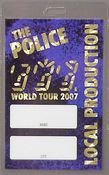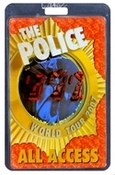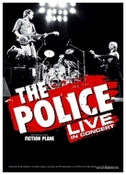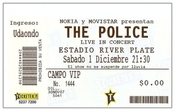
The Police showed their class...
In front of an audience of approximately 60,000, the British trio offered the first of two shows they will perform in the country, returning after 27 years. It was a concert of the highest level and quality.
Buenos Aires, December 2.—About 60,000 people had their revenge on Saturday night and enjoyed a fantastic concert by the rock trio The Police at River Plate. With the power of their music, the threat of a storm turned into just a few drops of rain that fell on Núñez.
The Police returned to Argentina after 27 years, performing for a select few connoisseurs and visionaries at the Obras stadium and the New York City nightclub.
With a top-notch performance that confirmed their qualities as instrumentalists, the group, comprised of Sting on bass and vocals, Stewart Copeland on drums, and Andy Summers on guitar, dispelled all the prejudices that had been raised since their reunion: many said "they got together for the money" or that "they weren't able to record a single new song."
New generations of listeners were able to enjoy one of the most influential bands of the '80s, and if this statement raises doubts, one only has to refer to Soda Stereo's first album to realize how important Sting and his friends were to Argentine rock.
Leaving the local scene behind, if the Police wanted to claim paternity rights, the Mexicans from Maná would have to return the fortune they've earned by copying, even the crudest imitation and the chords of Police songs.
But the Police themselves were responsible for dispelling any doubts, as Copeland proved he's still one of the best drummers in the world, Summers is an excellent guitarist, and Sting, a bassist with excellent taste who preserves his voice impeccably.
Aged like wine, time hasn't affected their talent, and it's only physically noticeable in Copeland and Summers.
Sting, on the other hand, looks athletic, well-groomed, and unbearably handsome, proving he's still a heartthrob capable of soothing consciences.
Dressed in black, surrounded by an interesting stage set that doesn't hide them but rather highlights their roles, the Police gave their all with great fervour in their first Buenos Aires concert.
The band kicked off with "Message in a Bottle," a classic, while Sting greeted the audience in Spanish and asked them to keep the lights on so he could see the crowd.
A few minutes later, the screens were covered in the blue, red, and yellow colors that identified the trio, while Summer kicked off with the chords of "Synchronicity II," and the stadium sang the opening "Oh Oh" along with Sting.
'Walking On The Moon' showcased Sting's impeccable voice and the enduring bond with the Argentine audience, whom the bassist has nurtured over several visits.
'Voices in My Head' was the surprise release from the album 'Zenyatta Mondatta' (1980), in which Sting asked for applause and received 60,000, who then marvelled at Copeland's wisdom with every beat.
The song was coupled with 'When the world is running down you make the best' and 'Zenyatta Mondatta', which has the emotional simplicity of a line that says 'when the world is running down, you do the best you can with what you have at hand'.
In "Driven to Tears" from "Zenyatta," Summer showed off his agile fingers to resurrect a highly emotional solo that was widely imitated in those years, while the insane "Hole in My Life" from the essential "Outlandos d'Amour" (1978) swept away the moral reservations of the audience, who sang a Beatles-esque "Yeah" until they were hoarse.
The new wave "Truth Hits Everybody" confirmed Sting's ability to create simple, catchy choruses like the beautiful "Every Little Thing She Does Is Magic" from "Ghosts in the Machine" (1981), which shows them as wise wanderers of white reggae.
On "Wrapped Around Your Finger," featured on "Synchronicity" (1983), a percussive set emerged from the bowels of the stage and Copeland perched on it, pounding away at a gigantic gong, while Summers assaulted the audience's memories with the opening chords. On this song, Copeland stole the applause.
"Do Do Do Da Da Da" from the "Zenyatta" album is a silly but effective song; it's to the Police what "Obladi Oblada" was to the Beatles, but the 60,000 people didn't care and danced for almost four minutes.
With "Invisible Sun," accompanied by videos of refugee camps in Africa, they reminded us that Sting was the quintessential politically correct and conscientious rocker in a pre-Bono era, before the U2 frontman swept everything by having the nerve to meet with George W. Bush—a bad word in rock.
Copeland once again excelled on percussion, while Sting coaxed sounds from a siku to shape "Walking in Your Footsteps," which speaks of walking the earth walked by saurians.
On screen, the band laughed at themselves again and made fun of being the dinosaurs of rock, showing images from a veritable Jurassic Park and demonstrating that music still has their backs.
The old and popular onomatopoeia of "Io Ie" came alive 27 years later in Argentine throats as soon as the band launched into "Can't Stand Losing You," delivering five minutes of rock fever at a blistering pace.
The red lights brought the stadium to life with "Roxanne," one of the 20 most important hits in rock history, which then delved into the tortuous yet beautiful song "King of Pain."
"Every Breath You Take" is one of the five best ballads in rock history and, according to polls, the best song of the '80s, but in essence, it's the soundtrack of possessive and jealous love. Beyond this, Sting once again proved himself a great singer, and the band was impeccable.
Satisfied with joy, Andy Summer remained on stage while his bandmates fled until he called them back with the chords of "Next To You."
As Sting sang, the screens showed images of the trio's youth, beauty, and strength, qualities they'll be able to show off in their second show at River Plate tonight.
(c) Diario de Cuyo
December 1, 2007
SET LIST
- Message In A Bottle
- Synchronicity II
- Walking On The Moon
- Voices Inside My Head
- When The World Is Running Down You Make The Best Of What's Still Around
- Don't Stand So Close To Me
- Driven To Tears
- Hole In My Life
- Truth Hits Everybody
- Every Little Thing She Does Is Magic
- Wrapped Around Your Finger
- De Do Do Do, De Da Da Da
- Invisible Sun
- Walking In Your Footsteps
- Can't Stand Losing You
- Roxanne
- King Of Pain
- So Lonely
- Every Breath You Take
- Next To You





